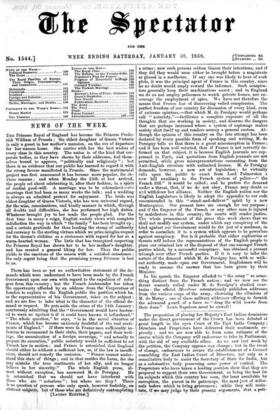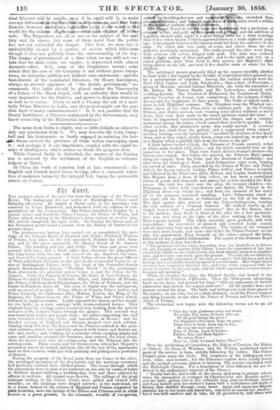NEWS OF THE WEEK.
Tire Princess Royal of England has become the Princess Frede- rick William of Prussia ; the eldest daughter of Queen Victoria is only a guest in her mother's mansion, on the eve of departure for her unseen home. She carries with her the best wishes of every class in this country. The union is of the kind that cor- porate bodies, as they have shown by their addresses, feel them- selves bound to approve, "politically and religiously " ; but there is no evidence that our public has learned to regard it with the strong favour manifested in Prussia. Since the matrimonial project was first announced it has become more popular, for ob- vious reasons ; and when Monday the 25th at last arrived, the people set about celebrating it after their fashion, in a sPirit of cordial good-will. A marriage was to be solemnized—the marriage that had been so many weeks the talk ; and a wedding is always an admitted pretext, for enjoyment. The bride was eldest daughter of Queen Victoria, who has won universal regard, for the wise, conscientious, and kindly manner in which, through all doubts and difficulties, she has performed her high duties. Whatever brought joy to her made the people glad. For the first time in many a reign, English society views with complete satisfaction the way in which "the family" has been brought up ; and a certain gratitude for thus lending the stamp of authority and currency to the sterling virtues which we prize mingles respect for the Queen's abilities as a statesman with regard for her as a warm-hearted woman. The little that has transpired. respecting the Princess Royal has shown her to be her mother's daughter, and has created a general liking for her. Thus the public.. yields to the emotions of the season with a satisfied conscience ; the only regret being that the promising young Princess is lost to ns.
There has been as yet no authoritative statement of the de- mands which were understood to have been made by the French Government upon our own with regard to the expulsion of refu- gees from this country ; but the French Ambassador has taken the opportunity afforded by an address from the Corporation-of London to explain to the English public the position which he, as the representative of his Government, takes on the subject ; and, we are free to infer what is the character of the official de- mand or request. He puts aside the crime of the 14th January ; courteously admitting that the "Government would have hasten- ed to warn us against it if it could have known it beforehand." " The whole question," he says, "is in the moral situation of France, which has become anxiously doubtful of the real senti- ments of England." If there were in France men sufficiently in- famous to recommend in their clubs, their papers, and their writ- ings, the assassination of a foreign sovereign, "and actually to prepare its execution," public notoriety would be sufficient to set French law in motion ; and France is astonished that England should either be without a sufficient law, or, if the law is insuffi- cient, should not remedy the omission. "France cannot under- stand this state of things ; and in that resides the harm, for she may mistake the true sentiments of her ally, and no longer
believe in her sincerity." The whole English press, al- most without exception, has answered M. de Persigny. He Is astonished that we should not have interfered with those who are " notorious " ; but where are they ? There IS no question of persons who only speak, however foolishly, on abstract subjects, but of those who are definitively contemplating [LATEST EDITION.] a crime ; now such persons seldom blazon their intentions, and if they did they would soon either be brought before a magistrate or placed in a madhouse. If any one was likely to hear of such plots, it was the principal agent of France in this country, since he no doubt would. amply reward the informer. Such conspira- tors generally keep their machinations secret ; and in England we do no not employ policemen to watch private homes, nor en- courage the employment of spies. We have not therefore the means that France has of discovering veiled conspiracies. The perfect freedom of our country for discussion of every kind, even of extreme opinions,—that which M. de Persigny would perhaps call "notoriety,"—facilitates a complete exposure of all the thoughts that are working in society, and disarms the dangers that are perhaps increased. where a system of espionage makes society shut itself up and renders secrecy a general custom. Al- though the opinion of this country on the late attempt has been declared. by every possible form of speaking and writing, M. de Persigny tells us that there is a great misconception in France ; and it has been well retorted, that if France is not correctly in- formed on that subject, it is because English journals are sup- pressed. in Paris, and quotations from English journals are not permitted, while gross misrepresentations emanating from the Anti-English circulate with unlimited licence. M. de Persigny demands, however, a new act of legislation ; he virtually calls upon the public to exact from Lord: Palmerston a new bill auxiliary to the French system of police—" the French Bill" it would be called ; and he prefers the demand under a threat, that, if we do not obey, France may doubt us and withdraw her alliance. Neither the English nation nor the English Legislature is likely to adopt the appendix to our code recommended in this "stand-and-deliver" spirit by a new Montesquieu. Our present laws are enough for our purpose ; and if the Emperor of the French or any other man is injured by malefactors in this country, the courts will render justice. The whole presentment of the press this week shows that we shall not modify our system, under which any conspiracy of the kind against our Government would be the jest of a madman in order to assimilate it to a system which appears to be powerless against conspiracy. Nor is it probable that either sophistries or threats will induce the representatives of the English people to place our oriminal law at the disposal of that one amongst French parties which, by a successful conspiracy, has obtained a Present triumph over other French parties. If it is easy to infer the nature of the demand which M. de Persigny has, with or with- out authority, made upon our Government, Englishmen will be ready to assume the answer that has been given by their Minister.
In his speech the Emperor alluded to "the army" as some- thing distinct from the French nation ; and. we now see the threat scarcely veiled under M. de Persigny's studied cour- tesies: the official .bfoniteur ostentatiously publishes addresses from the various corps of the army, chorusing the allusions of M. de Moray ; one of these military addresses offering to furnish the advanced guard. of a force to "drag the wild beasts from their dens." Louis Napoleon must be unwell !
The proposition of placing her Majesty's East Indian dominions under the direct government of the Crown has been debated at great length in the open Court of the East India Company ; 'Directors and Proprietors have delivered their sentiments co- piously ; and we are now able to form some estimate of the pourse which the Company will endeavour to take in Parliament, with the aid of any available allies. As we saw last week by the petition, the Company opposes any change ; but in the event of change, endeavours to secure the establishment of a Council resembling the East Indian Court of Directors, not only as a consultative body to assist the Secretary of State for India, but as a substantive body possessing some power of control, The Proprietors who have taken a leading position show that they are prepared to support their own Government, as being the best for its subjects which this country has seen, the least assailable by corruption, the purest in its patronage, the most just of tribu- nals before which to bring grievances ; while they will main- tain, if we may judge by their present arguments, that a poll- tical Minister will be unable, even if he could will it, to resist corrupt influencer isr the'aistribellion eif patronage, andellert Peel /lament, however gleeful as a legislative body; is the ward in iher world for the redress of grievaeees—the least ermie.nt or tribilo- nals. The Proprietors are all at sea on the subject of the ms— tiny and its causes, but some of them insist that the public' has not yet estimated the danger. This fear, we may say, is undoubtedly shared by a portion of society which influences though it does not publicly share the statesmanship of the day. The change of government, at a, time when we are still not cer- tain that we shall retain our empire, is deprecated with almost dramatic effect. Still, some of the Proprietors waver ; some admit that the case of the Company is not without grave excep- tions, its defensive petition not without over-statements ; and the beat-known of the nominated Directors, Sir Henry Rawlineon, always an avowed opponent of "the double government," re- commends that India should be placed under the Viceroyalty of a Prince of the Blood Royal, with an authority that would be very impressive for the Natives, and power to dispense clemency as well as to coerce. Given to each a Viceroy the aid of a mas- terly Prime Minister in India, and the project might cut the gor- dims knot of many embarrassments ! Is it not possible that Sir Henry Rawlinson, a Director nominated by the Government, may know something of the Ministerial intentions ?
The news from India is slight, and so little definite as almost to defy any conclusion from it. We may describe Sir Colin Camp- bell and his lieutenants as busily engaged in reducing the 110S- Jile forces around the province of Dude before converging upon it ; and perhaps it is our impatience, coupled with the rapid re- ceipt of intelligence, which makes us think the progress slow. While Central India is disturbed, the success of the Persian war is crowned by the settlement of the English as welcome lodgers at Herat.
In China the work of coercion had at last commenced ; the English and French naval forces having, after a sarcastic rejec- tion of moderate terms by the intrepid Yeh, begun the systematic attack on Canton.



























 Previous page
Previous page